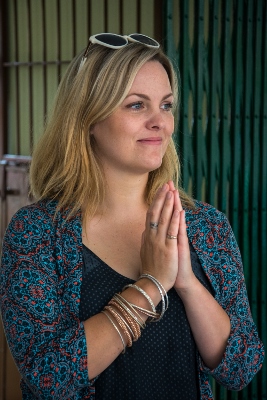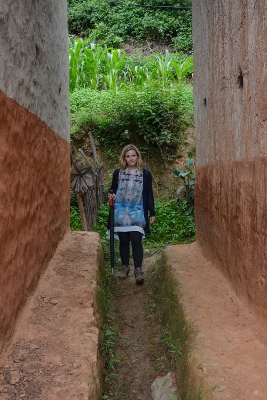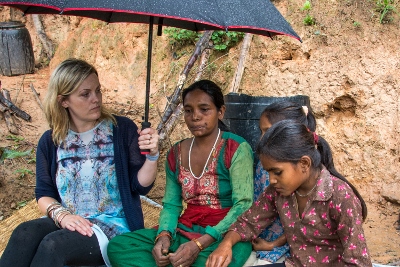Jo Joyner’s visit to Nepal: Part 2

About the author: Jo Joyner is an award-winning actress and CAFOD supporter whose work includes No Angels, EastEnders, Ordinary Lies and The Interceptor. In July 2015, Jo travelled to Nepal where she met communities who were severely affected by the devastating earthquakes and saw how crucial the work of CAFOD’s local partners had been in providing life-saving aid. In the second of three blogs, Jo writes about her experience. Read Jo’s first blog.
Kamala
I want to tell you about 35-year-old Kamala. A mother of three whose husband died in the earthquake, Kamala’s story will stay with me for a very long time.
Kamala is a Dalit woman, from the most socially excluded of more than 125 castes that exist in Nepal – one that we in the West may have heard of as ‘untouchables’. As such, Kamala and her children live outside a village on a patch of land, low down on the edge of the mountain. An unenviable location when the rain washes waste and rubbish from the village down to her door.
Donate to our Nepal Earthquake Appeal

To reach Kamala, we had to drive down a steep mud track. At the end of the track we could see down the mountain a lonely, clay ruin that could only be reached on foot.
When we finally reached Kamala and her two girls, not for the first time on this trip, I felt completely hopeless. What must she be feeling? Three months ago her meagre world was destroyed and her husband was killed. What little money or grain she had is gone, and so is her sole protector, the only other adult able to support her.
Now some healthy, wealthy woman from England had come to point a camera in her face and ask her what felt to me like stupid and futile questions. After I went what would become of her and her girls?
I wanted to tell her that it would help, it would in the end. That by sharing her story she would hopefully prompt more fundraising at home, that more schools might do a sponsored run like my kids have, that people might pick up the phone and make a donation to an organisation like CAFOD. That without the kind of donations people had already made she would never have been found, she wouldn’t have her makeshift home, her three month health supplies and the promise of help in September after the monsoon to rebuild. I hope that she understood.
Alone in the city
Kamala’s 14 year old son was in Kathmandu when the earthquake hit – having made the brave journey alone some months before. Kamala told us that when he missed an exam at school and wasn’t allowed to return, it was decided that he should go to the city to try and become a pot washer or another of the jobs that Dalit people are allowed to take.
Two weeks after the earthquake he had made his way back home to find that his father was dead. I thought of how he had made that journey without a penny, not knowing what he would find, fearing the worst and hoping for the best. I felt sick to the stomach at the thought of this child now, back in the city with more weight on his shoulders than ever: a mother and two girls depending on him, a country boy of the lowest caste, a child and alone.
Find out about CAFOD’s work in Nepal
Community
I grew up in a small village with, to this day, a strong sense of community. It was a carefree childhood with great neighbours and friends. We spent our time playing out and walking in the valley with not a care in the world. Like most country girls, by the time I was 17 I couldn’t wait to leave and find something more exciting. Like most country girls, 20 years later I couldn’t wait to return with my family to give my children the same carefree childhood.
It has been a pleasure to introduce my kids to the people that I have known all my life, the same safe, caring and fun community that I grew up in only older. Amongst the regulars that frequent the pub, fetes and coffee mornings, we joke that should disaster ever hit our small village, we will survive better than most because of our wealth of skills, strength and knowledge. Among us we’ll have someone for everything – a nurse, a builder, a farmer, a vet, strong young arms and old wisdom, someone to skin a rabbit and someone to manage the troops.
I know that, should there be a disaster in my village, the community would unite. Any long-standing feuds or disagreements would be forgotten. This is what happened in the days immediately following the earthquake in Nepal. Caste did become irrelevant – people defied the years of tradition in order to pull together and survive.

However, some months on, when the impact of the disaster is still very much being felt, people are returning to tradition. People may call Kamala ‘outcast’ or ‘untouchable’ but the fact remains that she is a mother of two daughters looking to her for answers, a human being, a woman who has no idea how she will survive alone.
With a heavy-heart, I left Kamala with the promise that I would share her story – with the promise that people care. I know that CAFOD and its local partners will continue to help Kamala in every way possible. Having donated over £3million to the emergency appeal, I know that CAFOD supporters care. For Kamala and all the other courageous people I met on my trip, please do continue to care.
Donate to our Nepal Earthquake Appeal online or call 0500 85 88 85
Read Jo’s third blog
Photos: CAFOD/Bikash Khadge
2 thoughts on “Jo Joyner’s visit to Nepal: Part 2”